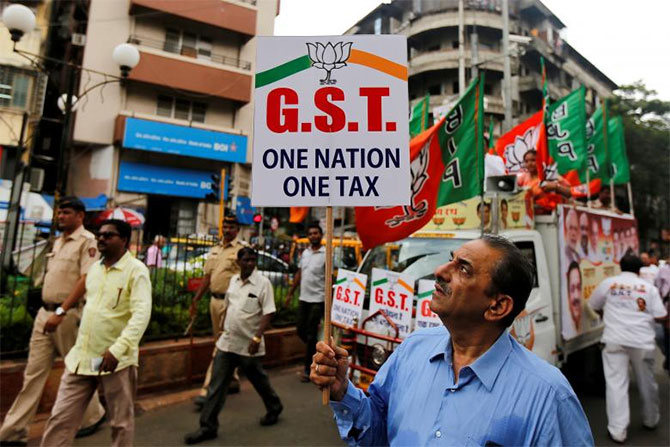Though the intent has been hailed as good for the economy, teething problems remain with a five-rate structure for various goods and services

The biggest tax reform since Independence - Goods and Services Tax (GST) - was kicked in from Friday midnight and companies say they will keep their date with the new indirect tax regime.
The GST will harmonise a maze of central and state levies into a national sales tax, creating a single customs union that would ease the cost of doing business and improve growth of India’s gross domestic product.
Though the intent has been hailed as good for the economy, teething problems remain with a five-rate structure for various goods and services, and elaborate documentation to ensure the tax, which works on a system of input credits from supplier to consumer, is paid.
While the fear of large companies has been trade destocking, consumer goods, auto and pharmaceutical majors, Business Standard spoke to, say these issues will ease in the coming months.
Small and medium enterprises (SMEs) though are yet to figure out the finer points of the GST and are expected to see business suffer in July due to their inability to comply on time.
"The general perception was that the government would extend the deadline (to roll out GST)," said Krishan Arora, partner, Grant Thornton India, who has worked with SMEs on the GST.
"Unfortunately, that was not the plan despite hardships caused due to the piecemeal finalisation of legislation and rules,” he said.
Large firms have another point of view on the issue, saying the GST was in the works for a while now.
“I think the government has done an excellent job of finalising the details of the GST and has remained committed to rolling it out on July 1.
With the good monsoon expected this year, I will not be surprised if we get into double-digit GDP growth in the next financial year,” Adi Godrej, chairman, Godrej Group said in a recent interaction.
“We are optimistic about the GST. It will bring in a lot of ease in doing business and we will be passing on the benefits to our customers,” K N Radhakrishnan, chief executive officer, TVS Motor, said.
“We are working closely with our supply chain to ensure smooth transition. While there will be initial hiccups, we will have to ensure that the movement to the new regime is handled well.
We are guiding our partners on how to manage old and new invoices,” Ajay Seth, chief financial officer, Maruti Suzuki, said.
“We have prepared ourselves to implement the new regime from July 1. We may see some delay in invoicing it for the first few days. However, we are internally ready.
Since we don’t want inventory to go out of stock, we have promised distributors and retailers of giving them the necessary discounts to cover their losses. This way, they do not need to destock our portfolio,” said C T Renganathan, managing director, RPG Life Sciences.
"We have a transition plan and are prepared to shift our working to the new system from July 1.
In our domestic business, we have far less number of suppliers and we are all ready. There will be some increase in working capital requirements, but we are prepared for it,” said G N Gauba, chief financial officer at automobile component major Motherson Sumi.
The latter’s group subsidiary MothersonSumi INfotech & Designs has helped in the company’s transition to GST.
Despite this, companies continue to be on their feet till the very end to avoid last-minute glitches. Hindustan Coca-Cola Beverages, bottling arm of Coca-Cola India, for instance, is conducting a massive training and capability-building programme currently for its distributors across the country to familiarise them with the GST.
Hundred trainers of Hindustan Coca-Cola, each split into teams of three, are camping in different parts of the country to train its 4,000-strong distributor force.
So far, the firm said, 50 per cent of this distributor team in states such as Karnataka, Rajasthan, Maharashtra, Jharkhand, Madhya Pradesh, West Bengal, Andhra Pradesh and Tamil Nadu have been trained by it.
Ashok Leyland, the commercial vehicle major, said it saw fleet operators holding their decision to purchase trucks even as manufacturers aligned production and inventory requirements in line with the GST. The near-term outlook, the company said, was moderate for the industry.
Ashish Trivedi, director-finance, International Automotive Components India, said challenges in terms of lack of clarity on certain transition rules and regulations remained.
"On the suppliers side, the challenges would be their ability to meet the compliance requirements of GST Network (GSTN), which requires timely and accurate uploading of individual transactions.
This has to also match with our transactions. As many of our vendors are smaller companies, they will have to invest significantly in terms of information technology and manpower to comply with the GSTN requirements," he said.
Meanwhile, hospitals, diagnostic chains and medical technology firms say they are bracing for new challenges ahead.
Though health services to consumers are exempt, there will be an increase in the tax component on devices and equipment such as syringes, needles and hospital beds by around 5-10 per cent, pushing up their price.
“It (GST) is a radical transformation of tax structure and given the changes, there is apprehension about its execution.
There are also concerns about managing the cost inflation because of the new rates,” Anjan Shah, secretary general, NATHEALTH (Healthcare Federation of India), said.
Photograph: Shailesh Andrade/Reuters